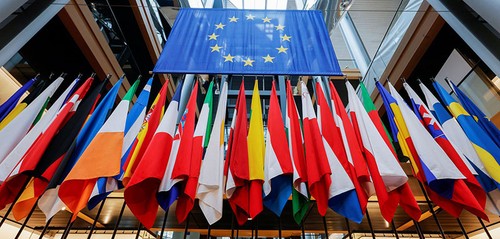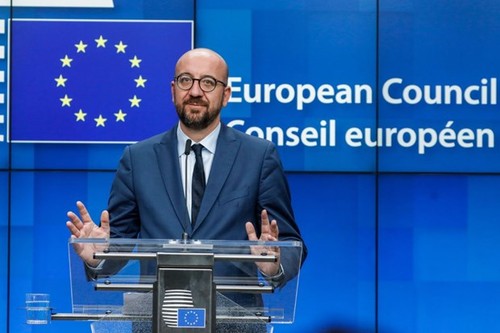 27 European Union leaders meet in Brussels on March 23 and 24, 2023. (Photo: Reuters) 27 European Union leaders meet in Brussels on March 23 and 24, 2023. (Photo: Reuters) |
The Summit is a venue for 27 European Union leaders to reach a consensus on the bloc’s challenges. UN Secretary-General António Guterres attended the event as a guest.
Affirming support for Kiev
Support for Ukraine was high on the agenda. EU leaders agreed to send Ukraine 1 million artillery shells in the next 12 months. Under the agreement, the European Commission will earmark 1 billion euros to to purchase 1 million artillery shells from existing stocks. Another 1 billion euros would go toward accelerating new orders and encouraging countries to work together on making purchases starting this May.
The joint arms purchase initiative will help the EU simultaneously supply artillery shells to Ukraine and add more weapons to the EU arsenal.
The EU leaders unanimously agreed not to ease sanctions against Russia. They discussed additional sanctions against Russia, and against trading with Russia through an intermediary. The European Council called for an immediate, complete, and unconditional containment of Russia's actions in Ukraine.
Since the Russia-Ukraine conflict began, EU members have provided 67 billion euros to Ukraine and imposed a range of unprecedented sanctions against Russia.
 European Council President Charles Michel. (Photo: AFP/Getty) European Council President Charles Michel. (Photo: AFP/Getty) |
Resolving EU challenges
Increasing the EU's long-term competitiveness and energy security, and dealing with immigration are the EU’s main problems other than helping Ukraine.
European Council President Charles Michel said it’s time for countries to recognize and fix their weaknesses. EU leaders called for ambitious action to consolidate markets toward a more integrated Capital Market Union, develop tax and financial services management mechanisms for the whole bloc to support businesses, increase renewable energy, digitize energy systems and energy storage facilities, and prioritize artificial intelligence (AI), quantum computing, Web 4.0, virtual reality, and network security.
The EU leaders took stock of actions to address high energy prices and ensure security of supply at affordable prices. They agreed to move forward without delay on the proposed revision of the EU’s internal electricity market design to ensure its adoption by the end of the year, and discussed plans to rapidly scale up environment-friendly technologies and energy to achieve climate change goals.
With illegal immigration increasing 64% last year and growing pressure on the bloc's external borders, the EU leaders discussed EC initiatives on integrated border management and the return of migrants. The EU is expected to enhance cooperation with countries of origin and transit countries.
UN Secretary-General António Guterres’s attendance at the EU summit, which took place a few days after the extension of Ukraine's grain export agreement, is considered an important factor for resolving the global food crisis.
At a joint press conference with European Council President Charles Michel on Thursday, Guterres called on the EU leaders to help the world "get back on track" toward Sustainable Development Goals. He welcomed the European Green Deal as a significant step in that direction and encouraged the EU to scale up its financial and technological cooperation with emerging and developing economies to close the emissions gap and deliver climate justice.